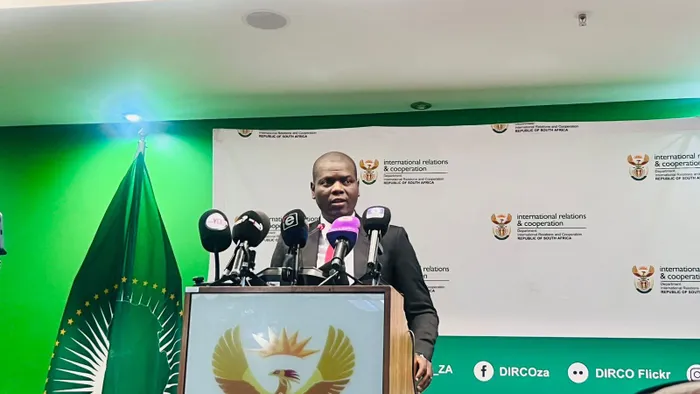Lamola outlines South Africa’s foreign policy wins ahead of G20 Summit

Minister of International Relations and Cooperation (Dirco) Ronald Lamola briefs the media on the country's strengthening of global partnerships ahead of G20 Summit
Image: Thabo Makwakwa
South Africa is cementing its role as a formidable player on the regional and international stage, delivering a string of diplomatic achievements and strategic foreign policy moves designed to strengthen the continent and global partnerships.
In a media briefing on Wednesday in Pretoria, Minister of International Relations and Cooperation (DIRCO) Ronald Lamola laid out the country’s dynamic foreign policy engagements, spotlighting key accomplishments and ongoing priorities.
At the forefront of South Africa’s regional leadership is its election as the Incoming Deputy Chair of the Southern African Development Community (SADC) Troika, secured during the 45th Ordinary Summit of Heads of State and Government in Antananarivo, Madagascar.
“South Africa’s position to chair SADC from August 2026, alongside our Chairship of the Southern African Customs Union, gives us a strong mandate to accelerate integration efforts, particularly in economic and trade cooperation within Southern Africa,” said Lamola.
Lamola stated that the summit addressed various regional challenges, including political stability, resource mobilisation, infrastructure, industrialisation, food security, health, and gender mainstreaming.
He added that South Africa reinforced its commitments by signing four legal instruments designed to enhance human rights protections, harmonise industrial policy, safeguard data integrity, and bolster tourism cooperation.
Lamola highlighted South Africa’s proactive stance on peace and security.
He stated that a delegation led by Ambassador Tebogo Seokolo recently engaged with leaders in Sahel countries, including Burkina Faso, Mali, and Niger, emphasising the importance of first-hand diplomatic efforts in volatile regions.
“We remain deeply concerned about the ongoing conflict in eastern DRC and continue to support peace initiatives by contributing to MONUSCO. Yet, we insist that lasting peace must be African-led and inclusive.”
He added that South Africa’s role as chair of the African Union’s High-Level Ad Hoc Committee on South Sudan (C5) reinforces its commitment to conflict resolution.
Lamola urged all stakeholders to faithfully implement the Revitalised Agreement on the Resolution of Conflict (R-ARCSS), noting that peace in South Sudan is “urgent and non-negotiable for regional stability.”
“The unconditional cessation of hostilities in Sudan is imperative. We call for renewed political dialogue, immediate humanitarian access, and respect for international law to halt the suffering.”
On the global front, the Minister stated that South Africa maintains candid partnerships, notably with the United States.
Despite ongoing tensions over trade tariffs and human rights assessments, Lamola affirmed the resilience of the bilateral relationship.
“Our engagements with the US reaffirm the strength of our bilateral relationship. Issues, including Broad-Based Black Economic Empowerment and land reform, remain internal but are always approached through constructive dialogue.”
He added that Europe remains central to Pretoria’s diplomatic calculus, arguing that a "high-level conversations between President Cyril Ramaphosa and European leaders - such as President Volodymyr Zelenskyy of Ukraine and President Emmanuel Macron of France - centre on geopolitical tensions and peace-building efforts."
"the Department’s Director-General, Zane Dangor, has been actively engaging Ukrainian officials,” he stated.
In the Middle East and Asia, he stated that South Africa advocates for an immediate ceasefire in Gaza and highlighted international legal obligations.
Lamola highlighted leadership in convening cross-regional dialogue platforms, including the Madrid and Hague Groups, which recently brought together 30 countries in Bogota to advance peace initiatives.
He said President Cyril Ramaphosa’s recent participation in the 9th Tokyo International Conference on Development in Africa (TICAD) signals promising prospects.
“Japan’s investment in South Africa marks a progressive approach to partnerships founded on equality and mutual benefit. Cooperation in infrastructure, energy, digital innovation, and skills development is key to driving Africa’s growth trajectory.”
The Minister hailed South Africa’s foreign policy momentum, saying it was most visible in its stewardship of the G20 Presidency - a historic milestone as the first African nation to hold this role.
With just 100 days remaining before the Johannesburg Leaders’ Summit, Lamola described the preparatory progress, stating that South Africa’s presidency reflected the country’s commitment to elevating the Global South’s developmental agenda on the world stage.
“We are at a pivotal juncture. With numerous working group meetings complete and Ministerial declarations adopted, our focus is now on finalising outcomes that embody solidarity, equality, and sustainability.”
Upcoming G20 events, including the Compact with Africa 2.0, continent-wide discussions on food security and industrialisation, and the second G20 Foreign Ministers Meeting at the UN General Assembly, are identified as critical milestones, Lamola asserted
“These events will showcase Africa’s voice and priorities in global economic governance, reinforcing the connection between peace and prosperity.”
Lamola also highlighted the importance of the G20 Social Summit, slated for November 18-20, which aims to broaden civil society participation beyond traditional engagement groups.
thabo.makwakwa@inl.co.za
IOL Politics
Related Topics: